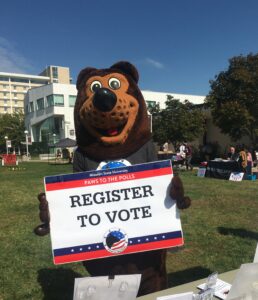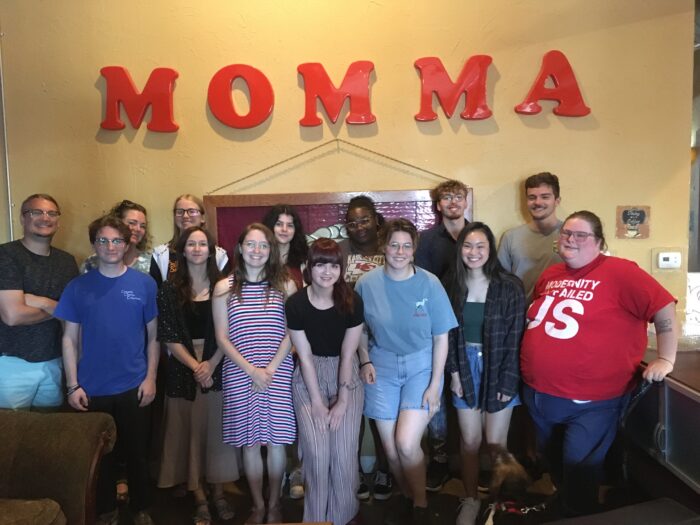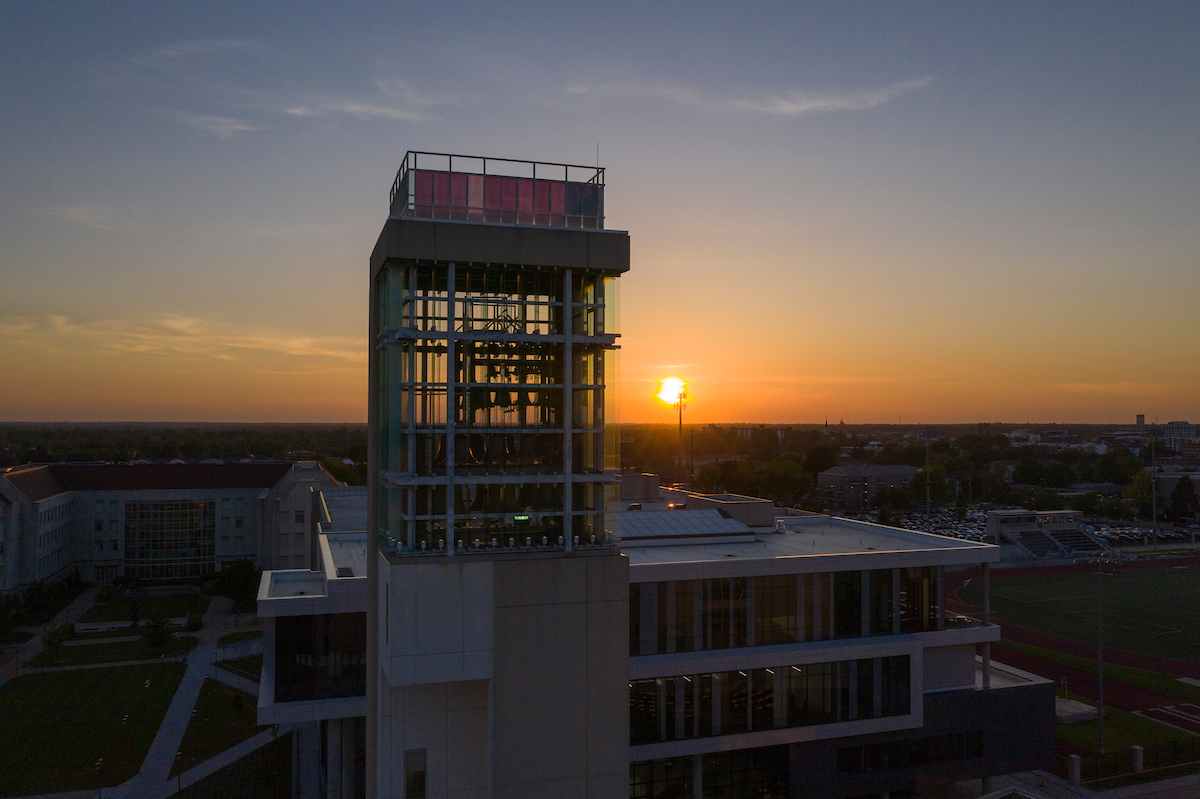Missouri State’s public affairs mission has a big impact on campus. Its reach extends beyond campus, too, as faculty find creative, meaningful ways to engage with our community.
Keeping Community Front and Center
These are just three examples of initiatives that leverage faculty expertise and relationships to make positive impacts on big issues. “Whether they’re helping demystify the voting process for new voters, working to make housing more attainable or walking people through tax season fears, these faculty and students embody our public affairs mission,” says Provost Dr. John Jasinski.
Getting “Paws” (and People) to the Polls

On March 5, keep an eye out in Plaster Student Union for Dr. Suzanne Walker-Pacheco, professor of sociology and anthropology, and the Paws to the Polls team. They’ll be on the 2nd floor helping people get registered to vote.
Walker-Pacheco and a group of students started Paws to the Polls back in 2020 as a way of fostering civic engagement. In addition to voting fairs, they organize panels and meet-and-greet events with elected officials and candidates.
The group is currently producing “What’s on Your Ballot?”, its second nonpartisan local election voter guide. “This year we’re excited to collaborate with the art and design department on this and other projects,” Walker-Pacheco says. Look for the guide in digital form in early March and in print after spring break.
From Walker-Pacheco’s perspective, the most important aspect of Paws to the Polls is that it creates familiarity with the voting process. “It can be difficult or intimidating to participate in something that is new and unfamiliar, and the voting process is not taught in school at any point,” she says. “We bring in the Greene County Clerk, Shane Schoeller, and his staff to demonstrate use of the voting machines so that the process becomes more familiar to students. We also highlight the importance of local elections, where turnout is typically well below 20%!”
Paws to the Polls collaborates with many partners to make its mission happen. In addition to the Greene County Clerk’s office, the group works with the League of Women Voters, Missouri State’s Office of Public Affairs Support and Student Activities Council, along with a number of campus offices and student organizations that are engaged in civic work.
“It’s all about creating community and engaging everyone to be part of it and let their voices be heard,” Walker-Pacheco says.
Fostering “The Springfield Way”
Last summer, Dr. Alan Tinkler, associate professor of English, and Dr. Catherine Hoegeman, associate professor of sociology and anthropology, rolled out The Springfield Way.
The program connects students in the Reynolds College of Arts, Social Sciences and Humanities with summer internship opportunities at local nonprofits. Critically, The Springfield Way provides funding so that students earn wages while they’re interning, which means they can afford to immerse themselves in the experience.
Tinkler and Hoegeman particularly focus on internships that are related to housing — an idea they took from the latest Community Focus Report for Springfield and Greene County, where housing emerged as a high-needs issue. Tinkler says that this issue also connects with a number of the Center for Disease Control’s concepts of well-being. “And it’s integrated with various dimensions of the United Nations Sustainable Development Goals, including ones that address poverty, well-being and gender equality, along with working conditions and economic growth,” he says.

Applications Now Open
The Springfield Way is now accepting applications for its second cohort. Tinkler says that the initiative is partnering with agencies that are “experts at moving theory to practice in our communities. We want students to learn from those experts.” These agencies include Community Partnership of the Ozarks, the Drew Lewis Foundation, Eden Village, empower: abilities, The Kitchen, Inc. and HOME Team.
The potential benefits for students are big. “When I think about higher education, I believe important outcomes align with understanding who we are and how we exist in community — both personally and professionally,” Tinkler says. “Community-engaged practice is central to experiential learning, and experiential learning allows us to more fully understand our disciplines.”
Taking the Terror out of Tax Season

You know the old saying about the inevitability of taxes, and you’ve probably heard the one about change being the only constant. If you put these together, you’re describing how Dr. Kerri Tassin, associate professor in the School of Accountancy, has maintained her commitment to sharing tax expertise with the community.
For several years, Tassin organized annual tax clinics as part of a service-learning initiative. The clinics served clients below a certain income level, and they were staffed by volunteers who were accounting students. It was a huge undertaking — Tassin says the planning process was a year-round endeavor — and it was popular. At the program’s height, 60 students staffed the clinic.
When Glass Hall underwent a major renovation, the clinics needed a new home. Tassin reached out to staff at Community Partnership of the Ozarks, who found sites for community-based clinics, and these clinics continue to offer services. However, as the economy and workforce have changed over the past few years, more accounting students are regularly able to find tax season internships with professional firms. While this is great for students’ career prospects, it means that fewer of them have availability to volunteer during tax season.
But Tassin’s still committed to sharing her tax expertise, especially with people who have limited access to professional accounting advice. “Some people experience incredible intimidation and fear,” she says. “They might think, ‘I can’t do this on my own.'” So when KY3’s Ashley Reynolds reached out about creating digital content that answers viewers thorniest tax questions, Tassin said, “That’s awesome. Let’s do it.”
For Tassin, it’s a unique advantage of being a both an accountant and a faculty member — as well as a representative of the university’s public affairs mission. “I love representing Missouri State in this way,” she says. “The university has done so much for me. To be able to reach out and serve the community, I love that.”
Around Campus…
Giving Day kicks off on March 5. Among the many opportunities to participate, several academic units have put together challenge grants — specifically tailored to the giving interests of their programs’ alumni and supporters.
“I’m thankful for the ways that our academic community nurtures relationships with people who believe in and draw inspiration from the great work they’re doing,” says Provost Dr. John Jasinski. “And I want to express my tremendous appreciation, in advance, for everyone who supports Giving Day this year. Together, we can make big things happen.”

